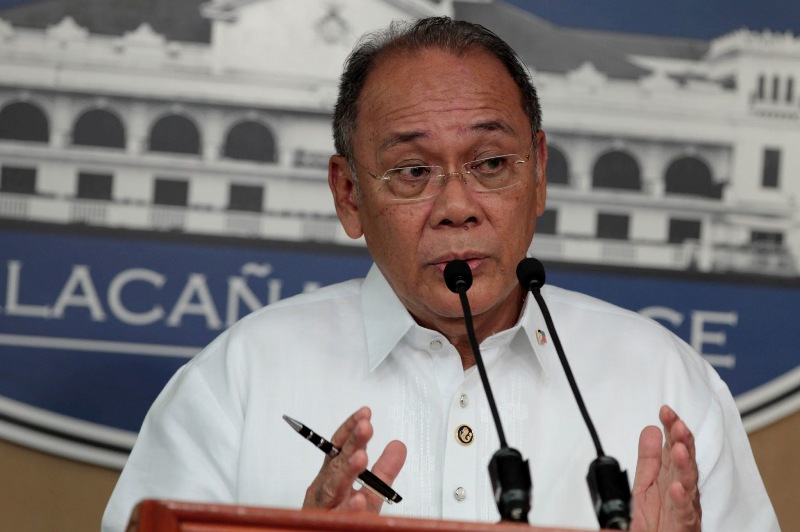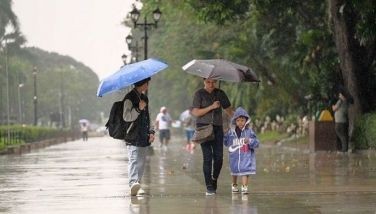Chinese rocket launchers to be discussed at bilateral meet

According to presidential spokesman Ernesto Abella, the issue can be tackled or raised by the Philippine panel at the bicameral consultative mechanism set up by the Philippines and China that will be launched today in Guiyang, Guizhou province in Southwest China. File
MANILA, Philippines - Malacañang is looking at the possibility of calling the attention of China over reports that it installed rocket launchers on a disputed reef in the South China Sea.
According to presidential spokesman Ernesto Abella, the issue can be tackled or raised by the Philippine panel at the bicameral consultative mechanism set up by the Philippines and China that will be launched today in Guiyang, Guizhou province in Southwest China.
“I’m sure that will be opened up – that will be touched on,” Abella said without elaborating.
However, Philippine Ambassador to Beijing Jose Santiago Sta. Romana said the BCM meeting will focus on terms of reference, setting of agenda and assessment of the situation in the South China Sea, which will be the basis of talks between the two countries related to the sea disputes.
Based on reports, China has installed rocket launchers on a disputed reef in the South China Sea to ward off Vietnamese military combat divers.
China has said military construction on the islands it controls in the South China Sea will be limited to necessary defensive requirements, and that it can do what it likes on its own territory.
The United States has criticized what it called China’s militarization of its maritime outposts and stressed the need for freedom of navigation by conducting periodic air and naval patrols near them, which angered Beijing.
Fiery Cross (Kagitingan) Reef is administered by China but is also claimed by the Philippines, Vietnam and Taiwan.
During his visit in Beijing earlier this week, President Duterte batted for the peaceful resolution of the South China Sea disputes and expressed hope the BCM would yield positive results.
As this developed, the defense and military establishments are yet again adopting the so-called Ostrich policy insofar as the current security development is concerned in the South China Sea.
As of yesterday, both establishments declined to discuss China’s installation of rocket launchers, tossing the matter to the Department of Foreign Affairs (DFA) to handle.
“I have read the published reports and the DFA has said they are verifying the information,” Col. Edgard Arevalo, Armed Forces of the Philippines Public Affairs Office (AFP-PAO) chief, said.
There are observations that this strategy to let the DFA handle maritime and territorial issues over the country’s regime of islands in the South China Sea has only emboldened China’s creeping incursion inside the country’s 200-nautical mile exclusive economic zone (EEZ).
Ostrich policy is a metaphoric expression referring to the tendency to ignore obvious dangers or problems and pretend they do not exist.
“We can help the DFA in verifying this report,” Arevalo said.
Claiming almost the entire South China Sea as an integral part of its maritime domain since ancient times, China has occupied seven reefs in the Spratlys and later reclaimed these formerly obscure maritime outcrops into what are now modern artificial islands.
China has also built an airfield over Zamora Reef (Subi) and Panganiban Reef (Mischief) in the disputed region.
China said the installation of rocket launchers on Fiery Reef is only for defensive purposes, amid reports that aside from Kagitingan, Subi and Panganiban Reefs, Beijing has already heavily fortified the area as well as their four other artificial islands in the region.
Code of conduct OK’d
China and Southeast Asian countries agreed yesterday to a framework for a long-mooted code of conduct for the disputed South China Sea, China’s foreign ministry said, as both sides step up efforts to ease tension in the strategic waterway.
China and the members of the Association of South East Asian Nations (ASEAN) had been hoping to this year agree on the framework, 15 years after committing to draft it.
Some ASEAN diplomats have expressed concern about whether China is being sincere, or whether ASEAN has enough leverage to get China to commit to a set of rules.
Some Southeast Asian countries, including Vietnam and the Philippines, as well as the United States, have expressed concern at what they see as China’s militarization of the South China Sea, including building air strips on man-made islands.
After a meeting between Chinese and ASEAN officials in the Chinese city of Guiyang, China’s foreign ministry said the framework had been agreed upon, although it gave no details of its contents.
The talks had been candid and deep and made positive achievements, it added in a statement.
Chinese Vice Foreign Minister Liu Zhemin, in comments carried on state television, said the framework was comprehensive and took into account the concerns of all sides.
- Latest
- Trending































